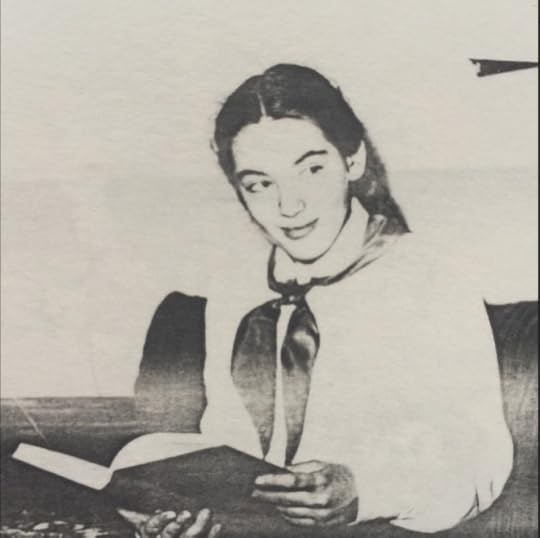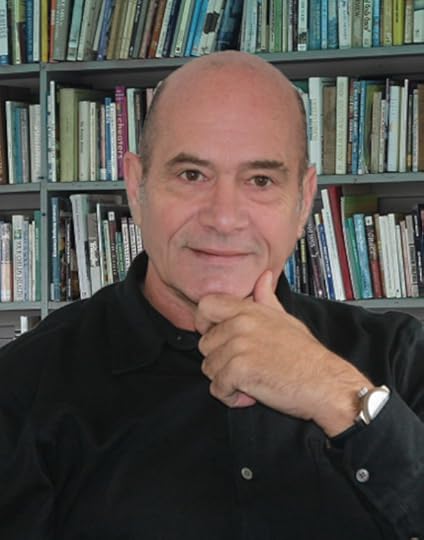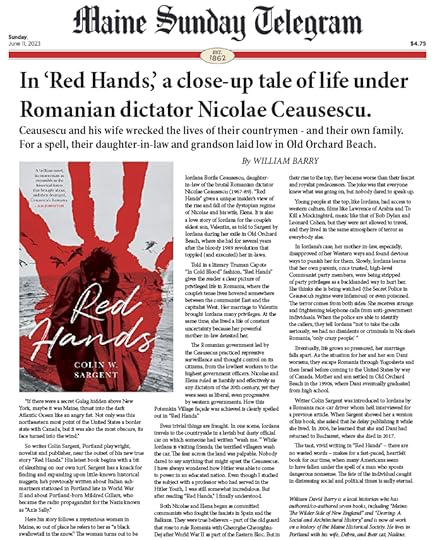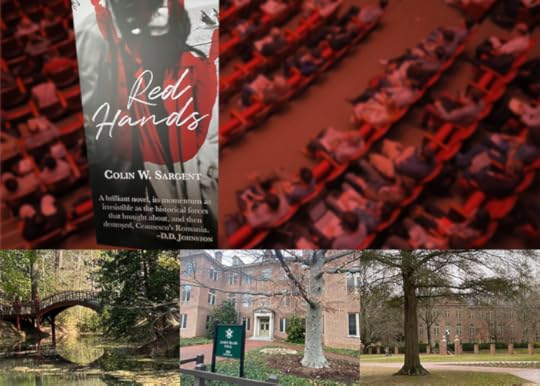Colin W. Sargent's Blog: Divagations
March 3, 2024
Chilling in Three Dimensions
Who was Elon Musk before Elon Musk? The hidden Charles Lindbergh you'll meet in my noir thriller Flying Dark from HellBound Books is full of surprises.
Because I'm a bit of a method writer, tracking down the Lone Eagle's haunts while writing Flying Dark has been quite an adventure for me. Among many places, I've visited the Hotel Beau Rivage Palace Hotel, beloved to "Careu Kent," in Switzerland; Long Barn in Sevenoaks Weald, Kent, England, where the Lindberghs stayed while Bruno Hauptmann was electrocuted; Highfields, where Lindbergh "led the searching party" to find Buster's alleged kidnapper; the Army Navy Club in Washington, D.C., where Lindbergh was a member; and the Olympic Stadium in Berlin, where Lindbergh sat close to Hitler in 1936.
The internet put Musk into a position where he can fool us all. Lindbergh was the first international star created overnight by radio.
Tune him in!
Because I'm a bit of a method writer, tracking down the Lone Eagle's haunts while writing Flying Dark has been quite an adventure for me. Among many places, I've visited the Hotel Beau Rivage Palace Hotel, beloved to "Careu Kent," in Switzerland; Long Barn in Sevenoaks Weald, Kent, England, where the Lindberghs stayed while Bruno Hauptmann was electrocuted; Highfields, where Lindbergh "led the searching party" to find Buster's alleged kidnapper; the Army Navy Club in Washington, D.C., where Lindbergh was a member; and the Olympic Stadium in Berlin, where Lindbergh sat close to Hitler in 1936.
The internet put Musk into a position where he can fool us all. Lindbergh was the first international star created overnight by radio.
Tune him in!
Published on March 03, 2024 08:11
November 25, 2023
Cocktail Pairing
Welcome to the noir thriller FLYING DARK, just released from Hellbound Books Publishing.
Not every book comes with a cocktail pairing!

Recipe for a Dark & Steamy
(to be sipped while reading
or discussing Flying Dark )
•Kraken Black Spiced Rum
•2 teaspoons brown sugar
•1 pat softened butter
•Boiling water to taste–
hey, you know who you are!
Cheers,
Colin
Not every book comes with a cocktail pairing!

Recipe for a Dark & Steamy
(to be sipped while reading
or discussing Flying Dark )
•Kraken Black Spiced Rum
•2 teaspoons brown sugar
•1 pat softened butter
•Boiling water to taste–
hey, you know who you are!
Cheers,
Colin
Published on November 25, 2023 08:21
November 19, 2023
New! Flying Dark

"I thought I'd written a literary novel, but when I pulled it out of the water it was a horror romance."
—Colin W. Sargent, December 2023
“It took me by surprise. The night’s thematic significance and the aerial imagery coupled with Hunter’s inner landscape kept me aloft–and terrified.” —Jennifer Hegeman on Colin W. Sargent's FLYING DARK
"A funny thing about the word eugenic. It sounds so innocent, doesn’t it? All I can tell you is, after you read this book, you’ll never feel the same way about Charles Lindbergh... Somebody’s never going to get that Father of the Year mug!" —Colin W. Sargent
The Story—a Noir Thriller
Aviator Charles Lindbergh’s aw-shucks schtick is a mask for a monster who destroys strangers and loved ones with equal indifference.
Hunter makes a fortune exposing fraudsters. When he stumbles across the corpse of his German teacher on his old reformatory grounds, he’s certain he is onto something evil and becomes drawn into the mystery.
Unsure who his own father is, Hunter is no angel himself. A former “black ops” military officer, he knows what he has to do to get the job done, no matter the cost.
Nightmares, hallucinations, and fragments of grisly memories knock on the door of his subconscious. Even the stage prop “Old Sparky” in his new lover’s lurid Grand Guignol connects a deadly circuit in Hunter.
Orisa cards warn of air disaster. Brainy Pia offers a path out of his disintegration. Traveling the globe—Paris, Berlin, Geneva, and London—Hunter can’t resist the magnetic scene south of New York where the Crime of the Century once played out.
Hunter is falling through the universe’s trap door. He’s headed for hell–unless he can redeem himself with one final flight.
Paperback, Kindle, November 2023
CLICK ON THE FOLLOWING AMAZON UNIVERSAL LINK FOR PAPERBACK, EBOOK, KINDLE UNLIMITED, AND AUDIBLE FORMATS IN YOUR COUNTRY'S MARKETPLACE: https://mybook.to/flyingdark
• Publisher : HellBound Books Publishing (November 2023)
• Language : English
• Paperback : 351 pages
• ISBN-10 : 1953905773
• ISBN-13 : 978-1953905772
• Dimensions : 12.7 x 2.24 x 20.32 cm
Published on November 19, 2023 08:40
October 14, 2023
Thank you, Los Angeles!
From KTLA, Channel 5, three days ago, on Red Hands;
"She Hid in Maine While the World Searched: Man Who Harbored Romanian Refugee Shares Her Remarkable True Story..."
;;;"This story is about all of us. We’re all susceptible to falling under the spell of a cult of personality.”— Colin W. Sargent, founding editor and publisher of Portland Magazine.
"She Hid in Maine While the World Searched: Man Who Harbored Romanian Refugee Shares Her Remarkable True Story..."
;;;"This story is about all of us. We’re all susceptible to falling under the spell of a cult of personality.”— Colin W. Sargent, founding editor and publisher of Portland Magazine.
Published on October 14, 2023 13:16
August 15, 2023
This Just In
Kennebunk Beach, Maine, is just a few miles from Iordana's hiding place–barely a seagull's flight away.
If only you could see this new review from Kirkus, Iordana. I have a second sense that you can:
RED HANDS
BY COLIN W SARGENT ‧
Poignant, frightening, packed with historical nuggets—a cautionary tale for contemporary times.
Sargent’s novel is based upon the life of Iordana (Dana) Borila Ceausescu, daughter-in-law of Romanian dictator Nicolae Ceausescu.
Written as a fictionalized memoir composed in the voice of Dana Ceausescu, this narrative is based upon Sargent’s interviews with the beleaguered ex-wife of Valentin Ceausescu, scion of the family that ruled Romania from the late 1960s through the 1980s. The interviews took place in Maine, where Dana and her son, Dani, lived in hiding after Ceausescu was overthrown and executed in the violent revolution of 1989. Born and raised in Bucharest, Dana is the daughter of devoted communists—her father is a high official in the Central Committee, and her mother is a respected newspaper journalist. As such, the teenager has enjoyed a life of privilege. Her parents’ fortunes begin a dramatic decline when Nicolae Ceausescu seizes control of the Central Committee in 1965. In that same year, Dana meets and begins dating Nicolae’s son, Valentin Ceausescu, much to the displeasure of both families. The couple marries in 1970, and Dana acquires a mother-in-law, Elena, who despises her (“Elena, through her network of Central Committee wives, began a disinformation campaign filled with rumor and innuendo about me that flashed all over the city”). Meanwhile, Nicolae becomes a media darling during the early years of his reign, turning to the West for loans to finance his plans for industrializing Romania (much of this money finds its way into the Ceausescu private coffers). Eventually, crippling debt plunges the country into chaos. Sargent’s novel is both a personal story of deep romantic love and a terrifying historical lesson about life in a police state helmed by a ruthless, cult-of-personality dictator. Always considered an outsider, Dana is nonetheless privy to the Ceausescu family’s extravagances and its unspeakable cruelty. Dozens of daily-life vignettes effectively capture Dana’s moments of joy and heartbreak, and the pervasive fear that extends as the scarcity of food, electricity, and heat grips the country. There’s even a breathless car chase across the border, with celebrity race car driver Catalin Tutunaru at the wheel.
Poignant, frightening, packed with historical nuggets—a cautionary tale for contemporary times.
If only you could see this new review from Kirkus, Iordana. I have a second sense that you can:
RED HANDS
BY COLIN W SARGENT ‧
Poignant, frightening, packed with historical nuggets—a cautionary tale for contemporary times.
Sargent’s novel is based upon the life of Iordana (Dana) Borila Ceausescu, daughter-in-law of Romanian dictator Nicolae Ceausescu.
Written as a fictionalized memoir composed in the voice of Dana Ceausescu, this narrative is based upon Sargent’s interviews with the beleaguered ex-wife of Valentin Ceausescu, scion of the family that ruled Romania from the late 1960s through the 1980s. The interviews took place in Maine, where Dana and her son, Dani, lived in hiding after Ceausescu was overthrown and executed in the violent revolution of 1989. Born and raised in Bucharest, Dana is the daughter of devoted communists—her father is a high official in the Central Committee, and her mother is a respected newspaper journalist. As such, the teenager has enjoyed a life of privilege. Her parents’ fortunes begin a dramatic decline when Nicolae Ceausescu seizes control of the Central Committee in 1965. In that same year, Dana meets and begins dating Nicolae’s son, Valentin Ceausescu, much to the displeasure of both families. The couple marries in 1970, and Dana acquires a mother-in-law, Elena, who despises her (“Elena, through her network of Central Committee wives, began a disinformation campaign filled with rumor and innuendo about me that flashed all over the city”). Meanwhile, Nicolae becomes a media darling during the early years of his reign, turning to the West for loans to finance his plans for industrializing Romania (much of this money finds its way into the Ceausescu private coffers). Eventually, crippling debt plunges the country into chaos. Sargent’s novel is both a personal story of deep romantic love and a terrifying historical lesson about life in a police state helmed by a ruthless, cult-of-personality dictator. Always considered an outsider, Dana is nonetheless privy to the Ceausescu family’s extravagances and its unspeakable cruelty. Dozens of daily-life vignettes effectively capture Dana’s moments of joy and heartbreak, and the pervasive fear that extends as the scarcity of food, electricity, and heat grips the country. There’s even a breathless car chase across the border, with celebrity race car driver Catalin Tutunaru at the wheel.
Poignant, frightening, packed with historical nuggets—a cautionary tale for contemporary times.
Published on August 15, 2023 08:06
June 29, 2023
Truth or Dare
The Historical Novel Society is an exciting group of readers and writers. The members believe you can experience the present by daring to venture into the past.
The HNS has twice invited me to be a panelist at their North American Conference, a pleasure both times.
Here's my opening statement at Historical Novel Society North America Conference's panel on "History is Character: How Historical Fiction Can Illuminate Events through Characters," where I appeared with novelist Mary F. Burns:
Thanks for coming. Red Hands is a nonfiction novel stemming from vivid, comic, bizarre historic events and real people. Think of the movie Titanic or the series The Crown. In the case of Titanic, many are in a lather about whether the fictional character Jack would have survived if he’d shared that floating door with Rose in the icy water. There’ve been detailed ‘scientific’ experiments to consider it. And this from the world that keeps saying, “But is it true?” News flash. Jack and Rose are not real people. Iordana Ceausescu and Valentin Ceausescu and their son Dani are.
Some of the events and conversations in Red Hands were recalled by Iordana 50 years after they happened, and like all memories are colored by events that have happened since. Terror is a very strong alchemist of memory.
During interviews, I kept asking Iordana what was happening as she was escaping the city while people were shooting at her car. Total wildness in Bucharest. A madhouse. Her passenger window blown out from reverberating explosions, smoke pouring in. She declined to answer me. She huddled down. Finally, after asking the question so many ways, I said, almost irritated, why didn’t you just slide away to the other side?
“Because there was blood on that seat.”
So it was back to page one.
I met Iordana while she was living in secret in Maine after she escaped the Romanian Revolution. The world was hunting her down to find her son, the sole Ceausescu grandson to the tyrant dictators Nicolae and Elena Ceausescu.
She and I had both experienced the Cold War, from different sides. I was a Navy pilot with deployments in the Mediterranean and Indian Oceans far from home, and she was a new-wave salon communist from the glamorous and privileged Nomenclatura.
We had nothing in common! Well, we each had a son, and we both adored seagulls, so in a mythic sense we lived on the same shore. During over 800 hours of in-depth interviews with Iordana, always showing up with her sunglasses and cigarettes, I was the filter, the gatherer, the story mind.
Novelization is a delivery system, a texture that stars dialogue, the story’s skin. Regina King’s One Night in Miami is a terrific show with dialogue between real people in a hotel room after Muhammad Ali won the heavyweight title from Sonny Liston. Regina King was born in 1971, but she takes us into that hotel room in 1965 and treats us to dialogue from Ali, Sam Cooke, Malcolm X, and Jim Brown.
Wikipedia’s entry on One Night in Miami never says fiction or nonfiction. They call the genre American Drama. So there’s a real sense of evolution here. Novelization takes you into that locked hotel room. It takes you where you’re not allowed to go.
Tim O’Brien is never defensive about it. “Fiction is better than the truth. I’ve worked on it!”
Let’s join Iordana and her little son Dani in a car that’s speeding through the streets of Bucharest during the Revolution of 1989. Massive crowds and shrill noises, shooting all around us, because as readers we are there. We’re racing away for our lives. The driver of the car is the international race-car driver Catalin Tutunaru, another real person who takes some dramatic turns in this nonfiction novel…
The HNS has twice invited me to be a panelist at their North American Conference, a pleasure both times.
Here's my opening statement at Historical Novel Society North America Conference's panel on "History is Character: How Historical Fiction Can Illuminate Events through Characters," where I appeared with novelist Mary F. Burns:
Thanks for coming. Red Hands is a nonfiction novel stemming from vivid, comic, bizarre historic events and real people. Think of the movie Titanic or the series The Crown. In the case of Titanic, many are in a lather about whether the fictional character Jack would have survived if he’d shared that floating door with Rose in the icy water. There’ve been detailed ‘scientific’ experiments to consider it. And this from the world that keeps saying, “But is it true?” News flash. Jack and Rose are not real people. Iordana Ceausescu and Valentin Ceausescu and their son Dani are.
Some of the events and conversations in Red Hands were recalled by Iordana 50 years after they happened, and like all memories are colored by events that have happened since. Terror is a very strong alchemist of memory.
During interviews, I kept asking Iordana what was happening as she was escaping the city while people were shooting at her car. Total wildness in Bucharest. A madhouse. Her passenger window blown out from reverberating explosions, smoke pouring in. She declined to answer me. She huddled down. Finally, after asking the question so many ways, I said, almost irritated, why didn’t you just slide away to the other side?
“Because there was blood on that seat.”
So it was back to page one.
I met Iordana while she was living in secret in Maine after she escaped the Romanian Revolution. The world was hunting her down to find her son, the sole Ceausescu grandson to the tyrant dictators Nicolae and Elena Ceausescu.
She and I had both experienced the Cold War, from different sides. I was a Navy pilot with deployments in the Mediterranean and Indian Oceans far from home, and she was a new-wave salon communist from the glamorous and privileged Nomenclatura.
We had nothing in common! Well, we each had a son, and we both adored seagulls, so in a mythic sense we lived on the same shore. During over 800 hours of in-depth interviews with Iordana, always showing up with her sunglasses and cigarettes, I was the filter, the gatherer, the story mind.
Novelization is a delivery system, a texture that stars dialogue, the story’s skin. Regina King’s One Night in Miami is a terrific show with dialogue between real people in a hotel room after Muhammad Ali won the heavyweight title from Sonny Liston. Regina King was born in 1971, but she takes us into that hotel room in 1965 and treats us to dialogue from Ali, Sam Cooke, Malcolm X, and Jim Brown.
Wikipedia’s entry on One Night in Miami never says fiction or nonfiction. They call the genre American Drama. So there’s a real sense of evolution here. Novelization takes you into that locked hotel room. It takes you where you’re not allowed to go.
Tim O’Brien is never defensive about it. “Fiction is better than the truth. I’ve worked on it!”
Let’s join Iordana and her little son Dani in a car that’s speeding through the streets of Bucharest during the Revolution of 1989. Massive crowds and shrill noises, shooting all around us, because as readers we are there. We’re racing away for our lives. The driver of the car is the international race-car driver Catalin Tutunaru, another real person who takes some dramatic turns in this nonfiction novel…
Published on June 29, 2023 14:19
June 21, 2023
Between the Lines
 Insightful interview questions from Martin Goodman, the publisher of Red Hands (U.S. release 2023)
Insightful interview questions from Martin Goodman, the publisher of Red Hands (U.S. release 2023)Red Hands is a compelling read. You get pulled into the story of a young girl's life, and then find yourself led through the excesses and collapse of a whole Communist State. As the book's editor, I know that such a vivid read only comes out of a tough and disciplined writing process. So once the novel was off to print I asked Colin these few questions. – Martin Goodman
Martin: Red Hands draws on five years of interviews with Iordana Ceausescu. With so much detail, why did you choose to write the book as a novel?
Colin: Novels are the highest form of truth. Her story is a cautionary tale, and while it focuses on her personal experience of getting involved with a dictator's family, it represents a whole country. Both history and her mother warn her about breaking the taboo. The more I listened to Iordana, the more I realized it was a horror story. If we're not careful, we can all get seduced and then destroyed by the nightmare.
Martin: At what point did you decide you had to commit to the project?
Colin: The moment she asked me to listen, I realized she had no one to trust. Here we were, two strangers from completely different worlds, different social strata, different genders. The only experience we really shared was, we both had a son. She was willing to go out on a limb and share with me. I'm a writer. I really had no choice.
Martin: Were these strictly interviews, or more like conversations? Could you say something about their shape, and how you structured the time?
Colin: Anyone who knows me knows that all conversations are interviews. The whole time we talked, Iordana was hiding in Maine. Always involving coffee ("You need a teaspoon of sugar for the liver"), often involving dinner and wine. One time and one time only: miniature golf. There was one point where she and Dani found themselves homeless, so we welcomed them as guests.
Martin: How probing could you be? And how hard was it for Iordana to recall what are often very intimate and troubling details?
Colin: Iordana could play possum. I always had the feeling we were talking in twilight, certainly she negotiating and me stumbling around in the dark. Sometimes she'd be cunning, bright-eyed, and loquacious, but if I hit on a topic where she felt really vulnerable she'd suddenly curl up and play dead. If she did this I'd stop, but I'd make a note of it. I'd put a star in my notes. Then, I'd go back during another interview to see if she'd relaxed about this. Sometimes I'd wait as long as two years before I felt the time was right. It did take a continuous review of my own notes. Very slowly, patterns emerged.
Martin: What did you need to do to forge Iordana's voice?
Colin: I captured Iordana's voice without stealing it–which would have been another crime against her.
Martin: Did she recognize her own voice in your work?
Colin: I certainly hope she did. Of course, Iordana never wanted to see the final manuscript. She became afraid of the very idea of the project itself. Over time I shared parts of it with her. I especially liked it when she'd smile, look up, and say, "How could you know?" I don't ever remember her saying this isn't true, but I do remember her saying, "This is too true."
Martin: What were Iordana's hopes for all these hours spent with you? What did she want the book to achieve?
Colin: When I first met her, she was desperately out of resources. She didn't want this to happen again. She wanted deeply to be heard. She didn't want to be dismissed and wind up one of the silent dead in the subway. But she was also concerned about Dani being caught up in a whirlwind he couldn't control. Dani at eight had certainly seen himself on posters in the subway calling for his death as the "Dracu" grandson.
Martin: What were her reactions on reading the manuscript?
Colin: Enthralled mortification. Laughter. Deep embarrassment. Relief. Fear. Toward the end of our relationship, when I floated the title Red Hands, she looked me in the eyes and winced. "What must you really think of me?" She looked down at her hands. "They are."
Martin: That's pretty intense. How did she feel about others reading it?
Colin: If you were reading it right now, she'd shake her head, eyes down, and 'shyly' take it out of your hand. She's revealed too much; you've come way too close. Who do you think you are, anyway, to see this? The next morning, dark circles around her eyes, she'll shyly give it back to you. Maybe with the corners of certain pages turned down. Maybe with a flower or a card. The scent of cigarette smoke clinging to the pages.
Martin: Did you have a model for this book when you were writing it, a novel it was most like?
Colin: Well, it starts out as The House of Seven Gables but ends up The Handmaid's Tale.
Martin: I understand Iordana's death freed you to publish the book. Did it also free the writing at all?
Colin: Yes. I realize we have much more in common. I can't see a gull on our shore without thinking of the gulls on hers. Both of our boys are men now, on their own.
Martin: This is a story of late twentieth century Romania. Thirty years on, how universal is the tale? Do you see any special relevance to now?
Colin: Despots come in all packages. We have to be on the lookout for the scinteia, the sparkle of evil.
Martin: So a novel can make us better prepared for what is to come, by giving us a mirror from the past?
Colin: Past, present, and future. The easy way out is to say, "Did that really happen?" and "Is this really true?" "That must have been really different then." Next up: "We wouldn't do that. We would never be so clueless. We have social media; we'd never let that happen." That's a natural reaction we all have when we want to be let off the hook. A novel is timeless. The future is prologue.
Published on June 21, 2023 12:36
June 20, 2023
Tomislav Longinovic chats with Colin Sargent about Red Hands

Tomislav Longinovic
Born in Serbia Tomislav Longinovic, PhD, is a world expert in Slavic folklore and imagery. His works include Vampire Nation: Violence as Cultural Imaginary and Vampires Like Us. He's taught at the Iowa Writers Workshop, at Harvard, and is emeritus professor of Slavic, Comparative Literature, and Visual Culture at University of Wisconsin-Madison.
Reading the novel Red Hands, which tells the story of Communist Romania through the eyes of Iordana Ceausescu, the dictator's daughter-in-law, brought back memories of Tomislav's youth in what was then Communist Yugoslavia. 'We had relatives who came to live with us in Belgrade from Romania during those worst years of heat and food restrictions,' he recalls.
Tomislav was happy to meet up with Red Hands author Colin W. Sargent to discuss his responses to the book, two contrasting communist regimes... and seagulls!
TL: From where I am right now, I'm looking across the Danube to Romania. I told some friends I'd be talking to you. One said, "Romanian smugglers would drop goods right here in the Danube. Old scrap metal." He pointed to the shore. "Even now, it's full of scrap metal at the bottom that wasn't picked up. The Romanian ships would drop, Serbian ships pick up." There was also a contraband business in oil.
CS: Something's always going on behind the scenes.
TL: That's very resonant in Red Hands. Of course, to Romanians, Yugoslavia was a Western country, a haven. My family had Romanian relatives across the river. When they were cold and hungry, two or three came here to take refuge with my father during the final years of the Ceausescu regime. So it's all very close to me.
CS: I'm hoping Red Hands connects with your Vampire Nation, the way the West has unconsciously or consciously tried to submerge Balkan countries with blood and vampire imagery. Even the Romanians couldn't resist. During the Romanian revolution, crowds put up "Death to the Dracu Grandson" posters on subway walls in Bucharest while Iordana and her son were fleeing the city.
TS: That's a really, really good connection [which makes Iordana's sneaker fascination for the West, along with other young members of the Nomenclatura, more complex]. I really liked reading that part.
CS: I laughed at the idea that playing bridge was forbidden by the Ceausescus, because it brought intellectuals together. Was that the case in Yugoslavia?
TS: No, not on that level at all. The main terror was in 1945 to 1948, and then when Tito broke with Stalin, things began to stabilize. Tito was tracking a middle course, getting western loans. We were comparatively lucky. None of my family was part of the communist movement. I always felt a private life at home, at the dinner table, in the 1950s to the middle 1960s. I found the same thing in the private moments of Iordana's life–they're described quite well in Red Hands. My father would always say, "Never say that in school!" Then we'd listen to the BBC and Radio Free Europe at night.
CS: What was the impact of the movie Dr. Zhivago on Eastern Bloc countries?
TS: It was bigger in Yugoslavia than in the rest of the Soviet bloc. We already had movies like that, our own Black Wave in films, critiquing the government. It got funny. Movie production companies created one edit was for film festivals outside the country, one inside the country or they would never be shown.
CS: Was godlessness in fashion in your Yugoslavia?
TS: Not really, not to that extent. My family was Orthodox Christian.
CS: Iordana is privileged, and like all of us she ducks in and out of self-knowledge. From your position just across the river, do you think of her as a character who's strong, weak, or how would you describe her?
TS: I would say very strong. Everything she had to go through. She's part of the Nomenclatura but sort of drops off, which makes her more interesting. It made me remember that I refused three times to join the communist party: at the end of high school, during University years, in the Yugoslav army [compulsory], which was a little hard to pull off. To stand up and say you have no interest in that. But to me the army wasn't fighting about the fate of the nation, but only for communism, which weakened the whole idea.
CS: Romanians were nicknamed the polenta people, flexing to any attack but somehow surviving. I can see a parallel to Italy, but is there a parallel to Yugoslavia?
TS: The Romanian word for it is mamaliga. It's a delicious dish, by the way. We were always brought up with the sense that we were the in-between country; that we were part of the east and west, being able to connect both.
CS Iordana and I were connected by our each having a son. But more like the 'raindrops that touch us all at once, uniting us,' we were also connected by our love for seagulls. You love the coast. You must know some gulls by name. What's your take on seagulls?
TS: That's a good question for me, because their number since I was a kid has been steadily and rapidly increasing. I used to draw them in flight. They're a menace now, beautiful from a distance but frightening up close. There's a city in Croatia where kids can't be taken outside; the gulls will steal their lunches. More recently, when alone in nature, like during yoga, I can almost feel like I can talk to them. You know, I call them over.
Published on June 20, 2023 07:35
June 18, 2023
Review of Red Hands, Maine Sunday Telegram, June 11, 2023

Maine Sunday Telegram
"In ‘Red Hands,’ a close-up tale of life under Romanian dictator Nicolae Ceausescu. It’s not pretty"
Ceausescu and his wife wrecked the lives of their countrymen – and their own family. For a spell, their daughter-in-law and grandson laid low in Old Orchard Beach.
Reviewed by William Barry
“If there were a secret Gulag hidden above New York, maybe it was Maine, thrust into the dark Atlantic Ocean like an angry fist. Not only was this northeastern most point of the United States a border state with Canada, but it was also the most obscure, its face turned into the wind.”
So writes Colin Sargent, Portland playwright, novelist and publisher, near the outset of his new true story “Red Hands.” His latest book begins with a bit of sleuthing on our own turf. Sargent has a knack for finding and expanding upon little-known historical nuggets; he’s previously written about Italian sub-mariners stationed in Portland late in World War II and about Portland-born Mildred Gillars, who became the radio propagandist for the Nazis known as “Axis Sally.”
Here his story follows a mysterious woman in Maine, so out of place he refers to her as “a black swallowtail in the snow.” The woman turns out to be Iordana Borila Ceausescu, daughter-in-law of the brutal Romanian dictator Nicolae Ceausescu (1967-89). “Red Hands” gives a unique insider’s view of the rise and fall of the dystopian regime of Nicolae and his wife, Elena. It is also a love story of Iordana for the couple’s eldest son, Valentin, as told to Sargent by Iordana during her exile in Old Orchard Beach, where she hid for several years after the bloody 1989 revolution that toppled (and executed) her in-laws.
Told in a literary Truman Capote “In Cold Blood” fashion, “Red Hands” gives the reader a clear picture of privileged life in Romania, where the couple’s tense lives hovered somewhere between the communist East and the capitalist West. Her marriage to Valentin brought Iordana many privileges. At the same time, she lived a life of constant uncertainty because her powerful mother-in-law detested her.
The Romanian government led by the Ceausecus practiced repressive surveillance and thought control on its citizens, from the lowliest workers to the highest government officers. Nicolae and Elena ruled as harshly and effectively as any dictators of the 20th century, yet they were seen as liberal, even progressive by western governments. How this Potemkin Village façade was achieved is clearly spelled out in “Red Hands.”
Even trivial things are fraught. In one scene, Iordana travels to the countryside in a lavish but dusty official car on which someone had written “wash me. ” While Iordana is visiting friends, the terrified villagers wash the car. The fear across the land was palpable. Nobody dared to say anything that might upset the Ceausescus. I have always wondered how Hitler was able to come to power in an educated nation. Even though I studied the subject with a professor who had served in the Hitler Youth, I was still somewhat incredulous. But after reading “Red Hands,” I finally understood.
Both Nicolae and Elena began as committed communists who fought the fascists in Spain and the Balkans. They were true believers – part of the old guard that rose to rule Romania with Gheorghe Gheorghiu-Dej after World War II as part of the Eastern Bloc. But in their rise to the top, they became worse than their fascist and royalist predecessors. The joke was that everyone knew what was going on, but nobody dared to speak up.
Young people at the top, like Iordana, had access to western culture, films like Lawrence of Arabia and To Kill a Mockingbird, music like that of Bob Dylan and Leonard Cohen, but they were not allowed to travel, and they lived in the same atmosphere of terror as everybody else.
In Iordana’s case, her mother-in-law, especially, disapproved of her Western ways and found devious ways to punish her for them. Slowly, Iordana learns that her own parents, once trusted, high-level Communist party members, were being stripped of party privileges as a backhanded way to hurt her. She thinks she is being watched (the Secret Police in Ceausecu’s regime were infamous) or even poisoned. The terror comes from both sides: She receives strange and frightening telephone calls from anti-government individuals. When the police are able to identify the callers, they tell Iordana “not to take the calls seriously, we had no dissidents or criminals in Nicolae’s Romania, ‘only crazy people.’ ”
Eventually, life grows so pressured, her marriage falls apart. As the situation for her and her son Dani worsens, they escape Romania through Yugoslavia and then Israel before coming to the United States by way of Canada. Mother and son settled in Old Orchard Beach in the 1990s, where Dani eventually graduated from high school.
Writer Colin Sargent was introduced to Iordana by a Romania race-car driver whom he’d interviewed for a previous article. When Sargent showed her a version of his book, she asked that he delay publishing it while she lived. In 2006, he learned that she and Dani had returned to Bucharest, where she died in 2017.
The taut, vivid writing in “Red Hands” – there are no wasted words – makes for a fast-paced, heartfelt book for our time, when many Americans seem to have fallen under the spell of a man who spouts dangerous nonsense. The fate of the individual caught in distressing social and political times is sadly eternal.
Published on June 18, 2023 09:15
Red Hands Debut Reading at William and Mary, U.S. Launch, April 2023

As I cross the Sunken Gardens, a sense of anticipation fills the air. Eager to share my words, I step into the hallowed Washington Hall at the College of William and Mary, ready to engage minds and unveil some of the surprises hidden within the pages of Red Hands, the story of Iordana Ceausescu.

Founded in 1693, the College of William and Mary holds a storied past. From its status as the second-oldest higher education institution in the United States to its influential alumni like Thomas Jefferson, this historic institution embodies a rich tapestry of knowledge, tradition, and academic excellence.
Jefferson kept some secrets close; Iordana Ceausescu, in exile in Maine, found the courage to reveal many of hers after years of frozen silence and dread that she'd be discovered in hiding after the bloody Romanian Revolution of 1989. "In a way, I was like all of Romania."
It's all coming out now, Iordana–your heedless privileges of growing up chic and communist in the Nomenclatura. Your secret romance with the dictators' son Valentin as you and he came to be known as the Romeo and Juliet of Romania. Your dread as your family's safety begins to unravel.
Your fright--or was it disgust–at being chased across the globe until you hit rock bottom–as an illegal alien in a cinderblock one-room apartment with TV in a deserted beach town in wintry Old Orchard Beach, Maine, a black swallowtail in the snow.
The amphitheater is packed, filled with the curious–students and fellow professors. I feel you’re here with us, Iordana, in spite of your passing. Welcome to the U.S. launch of Red Hands. Take a deep breath. Here we go!
Published on June 18, 2023 07:38
Divagations
Travel to Bucharest this summer in Red Hands, the story of the Romeo and Juliet of Romania.
- Colin W. Sargent's profile
- 40 followers



